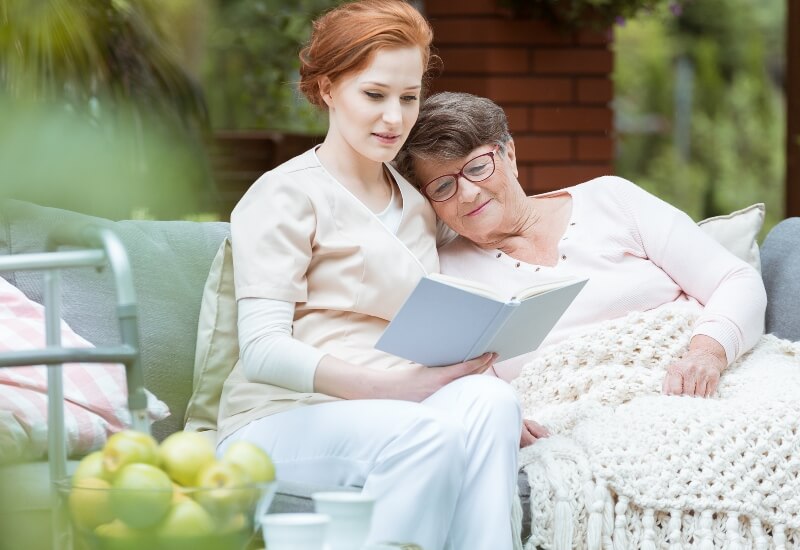Why Hospice Volunteers Are Important
Hospice volunteers bring light and comfort to those navigating the final stages of life. Their presence offers invaluable support to patients and families during a challenging time. After all, in-home hospice care isn’t just about medical treatments and logistical arrangements—it’s about human connections, dignity, and peace. Hospice volunteers are a crucial part of this process, providing the emotional and practical support that makes the end-of-life journey more bearable for everyone involved.
What Does a Hospice Volunteer Do?
The role of a hospice volunteer is multifaceted, with the overarching goal of supporting patients’ and their families’ needs. Some roles are hands-on, while others are more behind the scenes, but all are equally valuable. Here are some examples of what a hospice volunteer might do:
- Offer companionship: Spending time with patients is one of the most rewarding parts of the job. This may include sharing stories, playing games, reading aloud, or simply sitting quietly to help patients feel less isolated.
- Assist with light daily tasks: Volunteers often lend a hand with chores like organizing belongings, light cleaning, or grocery shopping. These small acts make a big difference for families who already feel overwhelmed.
- Help with emotional support: Volunteers serve as a listening ear for patients and their families. Whether helping a patient reminisce about fond memories or supporting a family member through grief, their presence is a source of comfort.
- Perform administrative tasks: While they don’t involve direct contact with the patient or their family, things like community outreach and fundraising are important parts of being a hospice volunteer.
Why Volunteering with Hospice Matters
Helping out with hospice care is not your average volunteer opportunity. It’s a deeply personal and often life-changing experience, both for the volunteers and the people they serve. Here’s how volunteers can make a difference:
- Support families during a difficult time: Families often feel a mix of emotions—grief, anxiety, guilt, exhaustion. Volunteers provide practical and emotional support to ease their burden and allow them to focus on the time they have left with their loved ones.
- Make a tangible impact: A hospice volunteer’s contributions make the patient’s final days brighter, more comfortable, and filled with compassion. From holding the person’s hand to running an errand for them, a volunteer’s efforts truly matter.
- Honor lives and legacies: Besides making patients comfortable, end-of-life care is about honoring their stories and legacies. Spending time with patients allows volunteers to preserve those moments and memories forever.
Why Do People Become Hospice Volunteers?
Everyone has a different reason. Some are led by faith to spend their free time helping people, and hospice feels like the right fit. Others are drawn to the work because they’ve seen firsthand how impactful it can be. This might involve coming from a nursing background and still wanting a way to help out after retiring. Firsthand experience can also stem from watching hospice volunteers care for your own family members, their kindness and compassion inspiring you to do the same for others.
How Volunteering Impacts Patients, Families, and Volunteers
Volunteering is a transformative experience for everyone involved. Here’s how patients, their families, and the volunteers themselves benefit:
For Patients:
- Reduced loneliness: Many hospice patients struggle with isolation, especially if they don’t have a strong support system. A volunteer’s visit can brighten their day and remind them they’re not alone.
- Peace of mind: Simply knowing someone is there to listen eases a patient’s stress. Volunteers create a safe, calming presence that fosters emotional peace.
- Joy on difficult days: From chatting about favorite movies to reliving cherished memories, hospice volunteers bring moments of lightness and laughter into otherwise dreary days.
For Families:
- Practical support: Families must juggle caregiving, work, and other responsibilities. When they feel stretched thin, volunteers step in to give them a much-needed break.
- Emotional relief: Knowing their loved one is in good hands allows family members to rest or attend to other responsibilities without guilt or worry.
- Connection with the hospice team: Volunteers act as a bridge between families and medical providers. If any needs or concerns arise, the volunteer will pass them along.
For Volunteers:
- Emotional fulfillment: Many volunteers find immense satisfaction in knowing they’ve made a real difference in someone’s life.
- Personal growth: Volunteering teaches valuable lessons about empathy, resilience, and the importance of being present. Many volunteers say it has transformed their outlook on life.
- Building community: You’ll connect with other volunteers, staff, and families, creating a sense of belonging and shared purpose.
How to Get Started as a Hospice Volunteer
If you want to be a part of all the wonderful things described here, volunteering with hospice may be right for you. Getting started is easy! Here’s how to become a hospice volunteer:
- Research local organizations: Find a local hospice organization that resonates with your values, like Agape Hospice NW in Portland, OR. We likely offer the volunteer opportunities you’re interested in, whether that’s direct patient care or behind-the-scenes support.
- Reach out for information: Agape Hospice NW holds informational sessions and offers resources to help new volunteers understand their role. Don’t hesitate to ask questions!
- Complete training: Receiving instruction prepares you for the emotional and practical aspects of the job. You’ll learn about creating boundaries, providing patient care, and supporting families effectively.
- Choose your role: Based on your skills and comfort level, you may choose to provide companionship care, administrative tasks, or something else.
- Make the commitment: Once you’re ready, embrace your role as a hospice volunteer! Even a few hours a week can make a world of difference.
Join Us at Agape Hospice NW
Are you ready to volunteer your time and talents? Perhaps you’re looking for hospice care so your loved one can get the help they need. Either way, Agape Hospice NW is a wonderful option. We pride ourselves on being a locally owned, community-focused organization that truly puts people first. Many larger corporations fail to provide a personal touch, but not us. Our compassionate doctors, nurses, and volunteers work tirelessly to benefit the lives of our patients and their families.
If you’re ready to make a difference, we invite you to explore our volunteering opportunities. Likewise, please contact us to learn more about our hospice services in Portland, OR.



